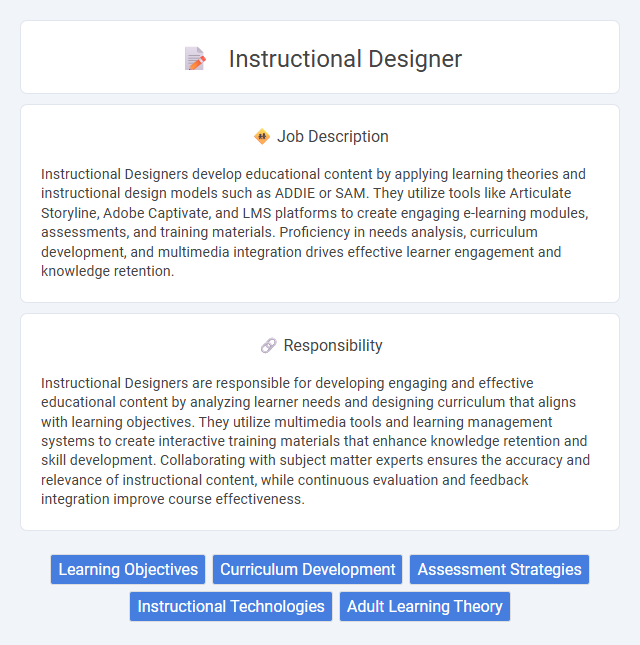
Instructional Designers develop educational content by applying learning theories and instructional design models such as ADDIE or SAM. They utilize tools like Articulate Storyline, Adobe Captivate, and LMS platforms to create engaging e-learning modules, assessments, and training materials. Proficiency in needs analysis, curriculum development, and multimedia integration drives effective learner engagement and knowledge retention.
Individuals who enjoy creating structured learning experiences and have strong organizational skills are likely suited for an Instructional Designer role. Those comfortable with technology and keen on understanding how people learn may find this career particularly fulfilling. However, people who prefer spontaneous tasks or dislike detailed planning might find the job less compatible with their work style.
Qualification
Instructional Designers typically require a bachelor's degree in education, instructional technology, or a related field, often complemented by certifications such as Certified Professional in Learning and Performance (CPLP). Proficiency in e-learning authoring tools like Articulate Storyline, Adobe Captivate, and Learning Management Systems (LMS) is essential for designing effective training programs. Strong skills in curriculum development, needs analysis, and multimedia integration further enhance an Instructional Designer's ability to create engaging and impactful learning experiences.
Responsibility
Instructional Designers are responsible for developing engaging and effective educational content by analyzing learner needs and designing curriculum that aligns with learning objectives. They utilize multimedia tools and learning management systems to create interactive training materials that enhance knowledge retention and skill development. Collaborating with subject matter experts ensures the accuracy and relevance of instructional content, while continuous evaluation and feedback integration improve course effectiveness.
Benefit
Instructional designers likely enhance learning experiences by creating engaging, effective educational materials tailored to diverse learner needs, potentially increasing knowledge retention and skill development. Their role may improve organizational training efficiency, leading to cost savings and better performance outcomes. They are also expected to foster continuous learning environments, supporting career growth and adaptability in rapidly changing industries.
Challenge
Instructional Designer roles likely face the challenge of continuously adapting educational content to rapidly evolving technologies and diverse learner needs. Balancing creative design with effective pedagogy may demand constant innovation and problem-solving skills. There is a probable need to collaborate across multiple departments while meeting tight project deadlines.
Career Advancement
Instructional Designers can accelerate career advancement by mastering learning technologies, data-driven course design, and user experience optimization. Gaining expertise in e-learning platforms, learning management systems (LMS), and multimedia content creation increases opportunities for leadership roles and consultancy positions. Certifications such as CPLP (Certified Professional in Learning and Performance) and proficiency in AI-driven instructional tools significantly enhance prospects for career growth in educational technology sectors.
Key Terms
Learning Objectives
Instructional Designers specialize in creating precise and measurable learning objectives that guide the development of effective educational content. By analyzing learner needs and aligning objectives with curriculum standards, they ensure training programs deliver targeted knowledge and skills. Well-crafted learning objectives enhance learner engagement and facilitate assessment of educational outcomes.
Curriculum Development
Instructional Designers specialize in curriculum development by creating structured learning experiences that align with educational goals and learner needs. They utilize learning theories, instructional strategies, and technology integration to design engaging and effective course materials. Data-driven analysis and continuous feedback ensure curricula remain relevant and improve learner outcomes.
Assessment Strategies
Instructional Designers develop assessment strategies that align with learning objectives to effectively measure learner progress and comprehension. They utilize a variety of formative and summative assessment tools, such as quizzes, simulations, and performance tasks, to gather actionable data on learner outcomes. Effective assessment strategies are essential for refining instructional materials and ensuring educational effectiveness in diverse learning environments.
Instructional Technologies
Instructional Designers specializing in Instructional Technologies develop innovative e-learning modules and digital training tools that enhance learner engagement and knowledge retention. They leverage cutting-edge software platforms such as Articulate 360, Adobe Captivate, and LMS systems like Moodle to create interactive and adaptive learning experiences. Expertise in integrating multimedia elements, learning analytics, and user-centric design principles drives the optimization of training effectiveness across diverse organizational settings.
Adult Learning Theory
Instructional Designers apply Adult Learning Theory principles to create effective training programs tailored to adult learners' needs, emphasizing self-direction, practical application, and relevance. They utilize techniques such as experiential learning, problem-solving activities, and real-world scenarios to enhance engagement and retention. Mastery of theories like andragogy and transformative learning is essential for designing impactful educational experiences in corporate and higher education settings.
 kuljobs.com
kuljobs.com